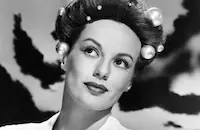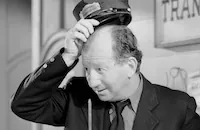Murder in the Big House

Brief Synopsis
Cast & Crew
B. Reeves Eason
Van Johnson
Faye Emerson
George Meeker
Frank Wilcox
Michael Ames
Film Details
Technical Specs

Synopsis
"Dapper Dan" Malloy, who is scheduled to be executed in the electric chair for the murder of the district attorney, sends a note to Morning News reporter "Scoop" Conner telling him that he wants to see him. Malloy's lawyer, Bill Burgen, has advised him that the governor is going to commute his sentence to life imprisonment and later pardon him and will announce this in a radio broadcast shortly before the execution is scheduled to take place. Scoop knows nothing about the proposed reduction in sentence, and Malloy tells him that, if he does go to the chair, he intends to incriminate many others before he dies. "Mile-Away" Gordon, Malloy's partner in the killing, is expected to be executed a few days after him. Bert Bell, who is trying to begin a career as a reporter, waits in vain to see Morning News editor/publisher Jim F. "Pop" Ainslee but is encouraged by reporter Gladys Wayne. Attempting to confirm Scoop's information, Pop phones the governor and learns that he has no intention of staying Malloy's execution. As this means that Malloy will be doing some "singing," Pop assigns Scoop to go to the prison and get the story. However, when Scoop gets drunk and passes out, Gladys decides to cover the event and takes Bert with her. A thunder and lightning storm rages around the prison as the execution draws near and reporters from many papers assemble. Warden John Bevins announces to them that a higher power than the state has punished Malloy as he has been struck by a bolt of lightning through the window of his cell. The reporters are invited to view the body, and the prison doctor confirms that Malloy was electrocuted. Surreptitiously, Bert takes a photograph of the burns on Malloy's head and feet. Back at the office, Pop fires Scoop, Gladys and Bert, then rehires them when Gladys tells him about Bert's theory that Malloy was actually electrocuted in the chair to keep him from talking. The district attorney whom Malloy and Gordon killed had prepared a number of charges against corrupt city officials and, although Pop feels that Bevins is honest, he sends Scoop and Bert to ask his permission to conduct an investigation. Bevins willingly agrees, and Scoop and Bert interview all of the key prison personnel, who unanimously swear that Malloy could not have been taken from his cell to the execution chamber. This is confirmed by Gordon, who tells them that Malloy did not pass by his cell, as he would have. Demoralized, Scoop and Bert head back to the city, and on the way, their car is shot at, then run off the road. Scoop is badly hurt in the ensuing crash and, after Bert goes for help, both disappear, and Pop cannot locate them. Meanwhile, Burgen assures Mrs. Gordon that her husband's sentence will be commuted, but she is skeptical. Mike, the gunman who shot at Scoop and Bert, is about to drive Burgen away when he sees Bert visit Mrs. Gordon. When Bert discovers from Mrs. Gordon that Malloy was listening for the governor's announcement on his radio headphones, he realizes that the radio was involved in his death. Just then, Mike takes several shots at Bert and Mrs. Gordon through a window, but misses. Bert asks Mrs. Gordon to arrange for him to talk with her husband, then calls Pop to tell him that Scoop is recovering in a private hospital. On the night Gordon is to be executed, Bert and Scoop join the other reporters at the prison. To avoid any charges of mismanaging this execution, the warden first takes the reporters to see Gordon in his cell, then shows them the execution chamber where the chair is tested at different voltages. At that point, the warden is informed that Gordon is lying on the floor of his cell. This time, however, there is no storm. The cell is unlocked in front of everyone and, as pre-arranged with Bert, Gordon gets up. Bert tells the warden and reporters that Gordon, like Malloy, had been told to listen to the radio over the prison's headphones, which were plugged into a wall socket connected directly to the electric chair power lines. When the chair was tested before Malloy's execution, the full voltage passed through the headphones, killing him. The warden, who had previously announced that he intended to sue the Morning News for slander, declares that he is withdrawing the suit and is determined to find out who arranged Malloy's death. However, in the warden's office, Bert asks him to sign a confession that he, along with the prison captain, was responsible for killing Malloy in order to protect his crooked political cronies. The warden draws a gun on Bert, who earlier had removed its bullets, and after a long brawl, Bert subdues Bevins. Later, the warden implicates Burgen and others, and the governor commutes Gordon's sentence. Bert and Gladys plan to get married.

Director
B. Reeves Eason
Cast

Van Johnson

Faye Emerson

George Meeker
Frank Wilcox
Michael Ames
Roland Drew
Ruth Ford

Joseph Crehan
William Gould
Douglas Wood
John Maxwell
Pat Mcveigh
Dick Rich
Fred Kelsey
Bill Phillips

Jack Mower
Creighton Hale
Henry Hall
Ray Montgomery
De Wolfe Hopper
Walter Brooke
Bill Edwards

Hank Mann
Frank Mayo
Jack Wise
Virgil Cain
Stuart Holmes
Don Phillips
Don Turner
Eddie Graham
Dick Chandlee
Wallace Scott
Pat O'malley
Sol Gorss

Lee Phelps
Leo White
Cliff Saum
Joe Devlin
Crew

Film Details
Technical Specs

Articles
TCM Remembers Van Johnson - Important Schedule Change on TCM In Honor To Salute VAN JOHNSON
The new schedule for the evening of Tuesday, December 23rd will be:
8:00 PM In the Good Old Summertime
9:45 PM A Guy Named Joe
12:30 AM Thirty Seconds Over Tokyo
2:30 AM The Last Time I Saw Paris
4:30 AM Thrill of a Romance
Van Johnson (1916-2008)
Van Johnson, the boyish leading man whose clean cut, All-American appeal made him a top box-office draw for MGM during World War II, died on December 12 in Nyack, New York of natural causes. He was 92.
He was born Charles Van Dell Johnson on August 25, 1916, in Newport, Rhode Island. By his own account, his early childhood wasn't a stable one. His mother abandoned him when he was just three and his Swedish-born father offered little consolation or nurturing while he was growing up. Not surprisingly, Johnson found solace in singing and dancing lessons, and throughout his adolescence, he longed for a life in show business. After graduating high school in 1934, he relocated to New York City and was soon performing as a chorus boy on Broadway in shows such as New Faces of 1936 and eventually as an understudy in Rodgers and Hart's musical, Too Many Girls in 1939.
Johnson eventually made his way to Hollywood and landed an unbilled debut in the film version of Too Many Girls (1940). By 1941, he signed a brief contract with Warner Bros., but it only earned him a lead in a "B" programmer Murder in the Big House (1941); his contract soon expired and he was dropped by the studio. Johnson was on his way back to New York, but as luck would have it - in the truest Hollywood sense - friends Lucille Ball and Desi Arnaz introduced him to Billy Grady, a lead talent scout at MGM, which was currently Ball's new studio. Johnson was signed up and almost immediately MGM had a star on its hands.
It might have been slow going at first, with Johnson playing able support in films such as Dr. Gillespie's New Assistant and The War Against Mrs. Hadley (both 1942). By 1943 the studio capitalized on his broad smile and freckles and starred him in two of the studio's biggest hits: A Guy Named Joe and The Human Comedy. Those two films transformed him into a boxoffice draw with a huge following, particularly among teenage girls. A near fatal car accident that same year only accentuated the loyalty of his fans, and his 4-F status as the result of that accident created an opportunity for him when so many other leading actors of the era (James Stewart, Clark Gable) were off to war. Johnson was quickly promoted as MGM'sleading man in war heroics and sweet romancers on the big screen: The White Cliffs of Dover, Thirty Seconds Over Tokyo (both 1944), Thrill of a Romance, the episodic Week-End at the Waldorf (both 1945), and a musical remake of Libeled Lady entitled Easy to Wed (1946).
Hits though these were, it wasn't until after the war that Johnson began to receive more dramatic parts and better material such as supporting Katharine Hepburn and Spencer Tracy in the political farce State of the Union (1948). other significant roles included the well-modulated noir thriller The Scene of the Crime, the grim war spectacle Battleground (both 1949), the moving domestic drama Invitation (1952) in which he played a man who is paid to marry a woman (Dorothy McGuire) by her father. Before he left MGM, he closed his career out in fine form with the sweeping musical Brigadoon, co-starring Gene Kelly and Cyd Charisse; and the lilting soaper The Last Time I Saw Paris (both 1954) with Elizabeth Taylor.
After he left MGM, the parts that came Johnson's way weren't as varied, but he had his moments in The Caine Mutiny (1954), the beguiling romance drama Miracle in the Rain (1956) with Jane Wyman; and his lead performance in one of the first successful made for-TV-movies The Pied Piper of Hamelin (1957). By the '60s, Johnson returned to the stage, and played the title role in London's West End production of The Music Man. He then returned to Broadway in the drama Come on Strong. He still had a few good supporting parts, most notably as Debbie Reynolds' suitor in Norman Lear's scathing satire on marital differences Divorce American Style (1967); and television welcomed his presence on many popular shows in the '70s and '80s such as Maude, Fantasy Island, The Love Boat and of course Murder She Wrote. There was one last graceful cameo in Woody Allen's The Purple Rose of Cairo (1985), yet for the most remainder of his career, Johnson worked mainly on the dinner theater circuit before retiring from showbiz completely by the mid-90s. He is survived by a daughter, Schuyler.
by Michael T. Toole

TCM Remembers Van Johnson - Important Schedule Change on TCM In Honor To Salute VAN JOHNSON
Quotes
Trivia
Notes
The title on the viewed print, which May have been a reissue or television print, was Born for Trouble.















